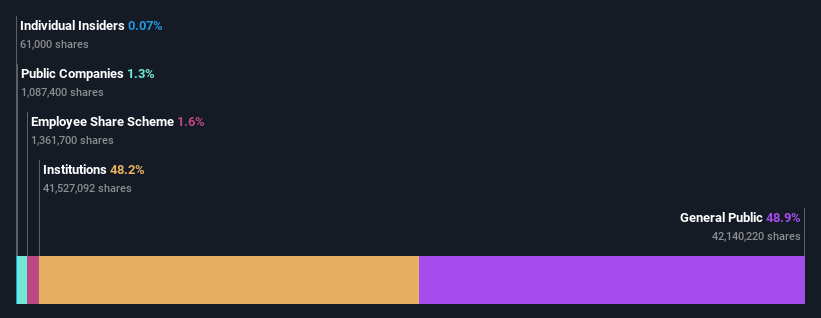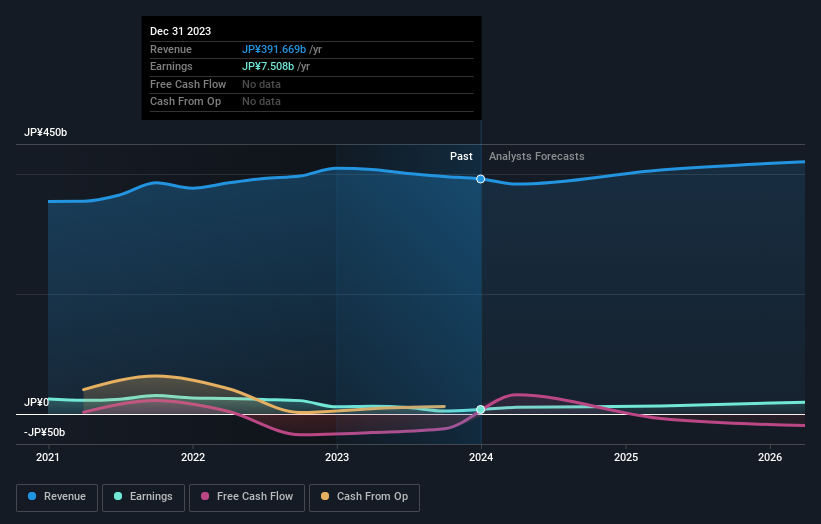Stock Analysis
Denka Company Limited's (TSE:4061) 5.1% loss last week hit both individual investors who own 49% as well as institutions

Key Insights
- Significant control over Denka by retail investors implies that the general public has more power to influence management and governance-related decisions
- A total of 25 investors have a majority stake in the company with 49% ownership
- Institutions own 48% of Denka
Every investor in Denka Company Limited (TSE:4061) should be aware of the most powerful shareholder groups. We can see that retail investors own the lion's share in the company with 49% ownership. Put another way, the group faces the maximum upside potential (or downside risk).
While institutions, who own 48% shares weren’t spared from last week’s JP¥10b market cap drop, retail investors as a group suffered the maximum losses
In the chart below, we zoom in on the different ownership groups of Denka.
Check out our latest analysis for Denka

What Does The Institutional Ownership Tell Us About Denka?
Institutions typically measure themselves against a benchmark when reporting to their own investors, so they often become more enthusiastic about a stock once it's included in a major index. We would expect most companies to have some institutions on the register, especially if they are growing.
Denka already has institutions on the share registry. Indeed, they own a respectable stake in the company. This can indicate that the company has a certain degree of credibility in the investment community. However, it is best to be wary of relying on the supposed validation that comes with institutional investors. They too, get it wrong sometimes. If multiple institutions change their view on a stock at the same time, you could see the share price drop fast. It's therefore worth looking at Denka's earnings history below. Of course, the future is what really matters.

Denka is not owned by hedge funds. Our data shows that Nomura Asset Management Co., Ltd. is the largest shareholder with 8.0% of shares outstanding. For context, the second largest shareholder holds about 3.7% of the shares outstanding, followed by an ownership of 3.7% by the third-largest shareholder.
On studying our ownership data, we found that 25 of the top shareholders collectively own less than 50% of the share register, implying that no single individual has a majority interest.
While it makes sense to study institutional ownership data for a company, it also makes sense to study analyst sentiments to know which way the wind is blowing. There are plenty of analysts covering the stock, so it might be worth seeing what they are forecasting, too.
Insider Ownership Of Denka
The definition of an insider can differ slightly between different countries, but members of the board of directors always count. The company management answer to the board and the latter should represent the interests of shareholders. Notably, sometimes top-level managers are on the board themselves.
Most consider insider ownership a positive because it can indicate the board is well aligned with other shareholders. However, on some occasions too much power is concentrated within this group.
Our information suggests that Denka Company Limited insiders own under 1% of the company. It is a pretty big company, so it would be possible for board members to own a meaningful interest in the company, without owning much of a proportional interest. In this case, they own around JP¥135m worth of shares (at current prices). It is good to see board members owning shares, but it might be worth checking if those insiders have been buying.
General Public Ownership
The general public-- including retail investors -- own 49% stake in the company, and hence can't easily be ignored. While this size of ownership may not be enough to sway a policy decision in their favour, they can still make a collective impact on company policies.
Next Steps:
While it is well worth considering the different groups that own a company, there are other factors that are even more important. Case in point: We've spotted 4 warning signs for Denka you should be aware of, and 2 of them are significant.
If you would prefer discover what analysts are predicting in terms of future growth, do not miss this free report on analyst forecasts.
NB: Figures in this article are calculated using data from the last twelve months, which refer to the 12-month period ending on the last date of the month the financial statement is dated. This may not be consistent with full year annual report figures.
Valuation is complex, but we're helping make it simple.
Find out whether Denka is potentially over or undervalued by checking out our comprehensive analysis, which includes fair value estimates, risks and warnings, dividends, insider transactions and financial health.
View the Free AnalysisHave feedback on this article? Concerned about the content? Get in touch with us directly. Alternatively, email editorial-team (at) simplywallst.com.
This article by Simply Wall St is general in nature. We provide commentary based on historical data and analyst forecasts only using an unbiased methodology and our articles are not intended to be financial advice. It does not constitute a recommendation to buy or sell any stock, and does not take account of your objectives, or your financial situation. We aim to bring you long-term focused analysis driven by fundamental data. Note that our analysis may not factor in the latest price-sensitive company announcements or qualitative material. Simply Wall St has no position in any stocks mentioned.
About TSE:4061
Denka
Denka Company Limited manufactures and sells organic and inorganic materials to electronic materials and pharmaceuticals in Japan and internationally.
Moderate growth potential with mediocre balance sheet.

